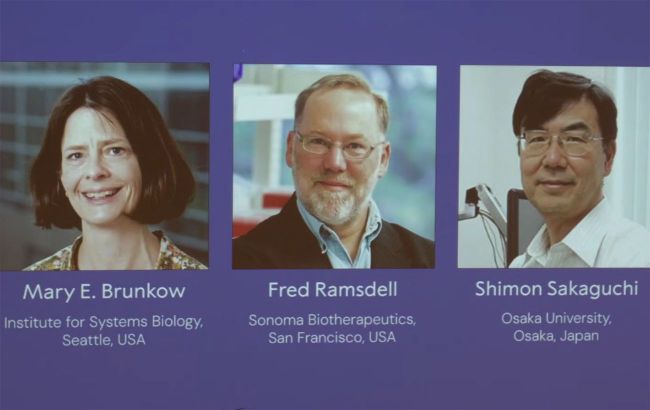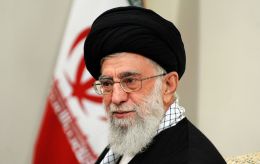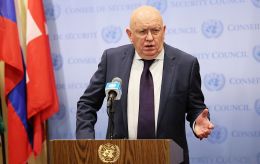Nobel Prize winners 2025 revealed: Medicine and physiology laureates
 Photo: Nobel Prize 2025 laureates in medicine and physiology announced (video screenshot)
Photo: Nobel Prize 2025 laureates in medicine and physiology announced (video screenshot)
On Monday, October 6, the Nobel Committee announced the winners of this year's Nobel Prize in Physiology or Medicine. The laureates are scientists Mary Brunkow, Fred Ramsdell, and Shimon Sakaguchi, for "groundbreaking discoveries concerning peripheral immune tolerance," the Nobel Foundation press service reported.
What the 2025 medicine laureates achieved
A powerful immune system must be properly regulated, or it can attack our own organs. The three scientists were awarded the 2025 Nobel Prize in Physiology or Medicine for their groundbreaking discoveries in the field of peripheral immune tolerance, which prevents the immune system from harming the body.
Every day, our immune system protects us from thousands of different microorganisms trying to enter the body. All of them look different, and many have developed similarities to human cells as a form of camouflage. So how does the immune system decide what to attack and what to protect?
Mary Brunkow, Fred Ramsdell, and Shimon Sakaguchi received the Nobel Prize for their fundamental discoveries related to peripheral immune tolerance. The laureates identified the defenders of the immune system, regulatory T cells, which prevent immune cells from attacking the body's own tissues.
"Their discoveries have been decisive for our understanding of how the immune system functions and why we do not all develop serious autoimmune diseases," said Olle Kämpe, chair of the Nobel Committee.
Shimon Sakaguchi went against the mainstream in 1995 when he made his first key discovery. He proved that the immune system is more complex than previously thought and identified a previously unknown class of immune cells that protect the body from autoimmune diseases.
Mary Brunkow and Fred Ramsdell made another important discovery in 2001 when they explained why a certain strain of mice was particularly susceptible to autoimmune diseases. They found that the mice had a mutation in a gene they named Foxp3. They also demonstrated that mutations in the human equivalent of this gene cause a severe autoimmune disease called IPEX.
Two years later, Shimon Sakaguchi was able to connect these findings. He showed that the Foxp3 gene regulates the development of the cells he had identified in 1995. These cells, now known as regulatory T cells, control other immune cells and ensure the immune system's tolerance to the body's own tissues.
The laureates' discoveries launched the field of peripheral tolerance, stimulating the development of medical treatments for cancer and autoimmune diseases. They may also lead to more successful transplants. Some of these treatments are now undergoing clinical trials.
Who won the medicine Nobel Prize last year
In 2023, the award went to Victor Ambros and Gary Ruvkun for the discovery of microRNA and its role in post-transcriptional gene regulation. The scientists studied how different types of cells develop.
They identified microRNA, a new class of tiny RNA molecules that play a crucial role in gene regulation.
The scientists' discovery revealed an entirely new dimension of gene regulation. MicroRNAs proved to be fundamentally important for the development and functioning of organisms.
Nobel Week 2025
The prize has been awarded annually since 1901 for outstanding achievements in physics, chemistry, physiology or medicine, literature, and efforts to preserve peace.
Since 1969, the Sveriges Riksbank Prize in Economic Sciences in Memory of Alfred Nobel has also been awarded.
Schedule for announcing the 2025 laureates
The 2025 Nobel Prize winners will be announced from October 6 to 13:
- October 6 — Physiology or Medicine
- October 7 — Physics
- October 8 — Chemistry
- October 9 — Literature
- October 10 — Peace
- October 13 — Sveriges Riksbank Prize in Economic Sciences in Memory of Alfred Nobel
Meanwhile, a group of lawmakers submitted a draft resolution to the Verkhovna Rada urging the Nobel Committee to nominate US President Donald Trump for the Nobel Peace Prize.
The president himself stated that if he does not receive the Nobel Peace Prize, "It'd be a big insult to our country."
Moreover, in January 2025, Elon Musk, businessman and owner of the social network X, was nominated for the Nobel Prize for allegedly defending freedom of speech.
Members of national legislatures, government officials, current heads of state, and representatives of certain organizations can nominate candidates.

